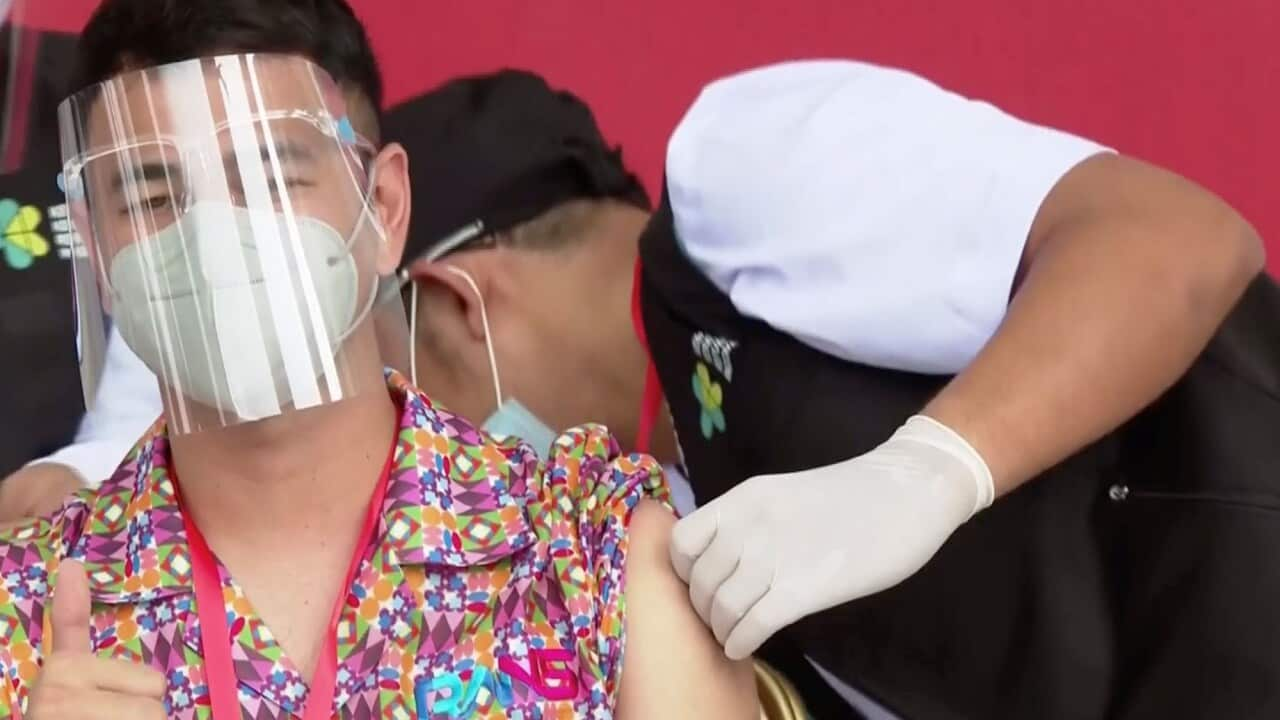The first lot of Australians are due to receive a coronavirus vaccine as soon as mid-February.
But while the federal government says it won’t make vaccinations compulsory, state governments and privately owned businesses could take a different stance.
On Monday, , and said businesses could do the same.
"The more people that are vaccinated, the greater likelihood we can have a return to normality as we know it," Ms Berejiklian said.
But how far could governments and businesses go to encourage people to get the jab?

In Britain, 82-year-old Brian Pinker receives the Oxford University/AstraZeneca COVID-19 vaccine - the same vaccine Australia will recieve next month. Source: AAP
Could the government still decide to make vaccines mandatory?
Yes. Legally, there is nothing stopping the federal government from making vaccines mandatory.
And, it wouldn’t be an Australian first.
The government made vaccinations mandatory in the 19th century to combat smallpox - which became the first infectious disease to be eradicated worldwide in 1979.
Sydney University Professor of Health Law and Ethics, Cameron Stewart, said the need for mandatory vaccinations all but disappeared when people realised how effective that vaccine was.
“Most people realised that vaccinations were safe and effective, so the rates of vaccination were still really, really high, and there wasn’t a social need to have compulsory vaccination,” he said.
“By the end of the 20th century, we started seeing the collapse or the rapid decline in vaccination rates, and then it came up again for discussion.”
But, the government already ruled out making COVID-19 vaccines compulsory back in August, with Prime Minister Scott Morrison saying “we can’t hold someone down and make them take it”.
Will enough people get vaccinated if it's not mandatory?
While it looks like the federal government won’t mandate vaccines, state governments and privately owned businesses can put in place regulations that could make not being immunised impractical.
There are already vaccine requirements in some professions; for example, some healthcare workers need to get the flu shot every year, and abattoir workers need to be immunised against Q fever, a bacterial infection that can cause a severe flu-like illness.
And, late last year, Qantas CEO Alan Joyce said anyone seeking to fly internationally with his carrier would eventually need to show proof that they have been vaccinated against COVID-19.
Professor Stewart said regulations like these should be sufficient to ensure high rates of immunisation without the need to make it mandatory. “The states may very well not want to exercise their coercive power to force people into having vaccinations, and one of the reasons may be that private operators themselves might be [placing] conditions on entry ... like ‘We won’t let you ride this bus service’ or ‘We won’t let you get on this plane unless you have a vaccine history’,” he said.
“The states may very well not want to exercise their coercive power to force people into having vaccinations, and one of the reasons may be that private operators themselves might be [placing] conditions on entry ... like ‘We won’t let you ride this bus service’ or ‘We won’t let you get on this plane unless you have a vaccine history’,” he said.

A vial of the COVID-19 vaccine developed by Oxford University and UK-based drugmaker AstraZeneca. Source: Press Association
“If anything, it may be that the government needs to regulate the other way - they might need to set down some particular circumstances where people might be able to get an exemption, for example.”
Can businesses deny service to those who refuse the vaccine?
Yes, most of the time.
Associate Professor Luke Beck from Monash University, who specialises in constitutional law, says nine times out of 10, privately owned businesses could legally refuse service to the unimmunised.
“It’s kind of like an RSL club saying ‘you can’t come in unless you’re wearing a collared shirt’ or ‘you can’t come in if you’re wearing thongs’ - it’s just a condition of entry for a private business, and for the most part, private businesses can do that.”
“Where it gets a little bit tricky is when it comes to people with medical conditions that mean they might not be able to get vaccinated, and most states and territories have anti-discrimination laws that prevent private businesses from discriminating against people on the grounds of certain health conditions.” But much like people with certain health conditions are exempt from various mask mandates around the country, businesses could navigate this challenge with similar exemptions for those who cannot safely be vaccinated.
But much like people with certain health conditions are exempt from various mask mandates around the country, businesses could navigate this challenge with similar exemptions for those who cannot safely be vaccinated.

AstraZenecas headquarters in Sydney. Source: AAP
Associate Professor Beck says the other challenge would be giving people enough time to get vaccinated before introducing restrictions on service.
“It’ll take quite some months for everyone in the population to have access to a vaccination, so given the practical reality, most businesses won’t really be able to impose these sorts of conditions of entry for quite some time,” he said.
People in Australia must stay at least 1.5 metres away from others. Check your jurisdiction's restrictions on gathering limits.
If you are experiencing cold or flu symptoms, stay home and arrange a test by calling your doctor or contact the Coronavirus Health Information Hotline on 1800 020 080.
News and information is available in 63 languages at
Please check the relevant guidelines for your state or territory: , , , , , , ,



